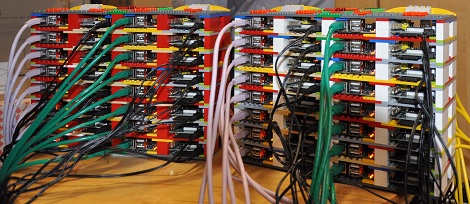Sample Projects
The following projects are currently being explored. These projects by no means represent everything that can be done with a Raspberry Pi, just the ones we have started with. A huge range of projects have been attempted by developers all around the world. You can see some of the more interesting projects here.
Raspberry Pi Electronics
Although the Raspberry Pi is inherently a computing device, it has the potential to be used with a variety of electronic components. The Raspberry Pi features a series of GPIO connections, which can be used to do anything from lighting an LED, to implementing more complex circuits. After a little bit of work, the Raspberry Pi can be used to explore basic electronic engineering and low-level computer programming, in a similar way to the Computer Organisation and Architecture (CS132) module's lab sessions.
Click here to find out more about 'Raspberry Pi Electronics'.
Image Processing with Raspberry Pi
A visually impressive example of a Raspberry Pi project comes from the use of its (relatively) powerful graphics capabilities, and using this to perform image processing. Using a basic webcam, the Raspberry Pi can be used to record images and create stunning visual effects. In this sample project, objects in view are recorded and their image retained on the screen over a series of frames. As the object moves, patterns are produced as previous images persist. This works in a similar way to a camera taking a photo of a light being moved using a low shutter speed. This project has been included to demonstrate some of the more graphics-intense activities the Raspberry Pi can handle.
Click here to find out more about 'Image Processing with Raspberry Pi'.
Parallel Computing with Raspberry Pi
One of the larger projects currently being attempted is to produce a cluster of Raspberry Pis, providing a platform to learn more about parallel computing. Our sample project involves connecting four devices, although at least 64 Raspberry Pis could be connected together to function as a single computer.
 |
The Raspberry Pi Supercomputer, Iridris-Pi, created by Simon Cox and headed up by the University of Southampton. The Iridis-Pi is built from 64 Raspberry Pis, and has access to 1TB of disk space using each Raspberry Pi's 16GB SD card. |
Click here to find out more about 'Parallel Computing with Raspberry Pi'.
Raspberry Pi as a Development Platform
One of the great selling points of the Raspberry Pi is its ability to support other software development projects. Being a fully-functional computer which fully supports many UNIX-based distributions, the Raspberry Pi provides a great platform for experimenting with operating systems programming. Each operating system is loaded from an SD card image, and blank OS images are widely available for free from the Raspberry Pi Foundation's website, so it is nearly impossible to break one. Plus the devices are not tied into the DCS Red Hat UNIX system, so you are free to experiment with a root account.
Click here to find out more about 'Raspberry Pi as a Development Platform'.
Raspberry Pi News
iLab Workshops
The DCS Interaction Lab (iLab) is run every Wednesday from 4pm to 6pm in the CS0.01 lab.
Please come along and see some of the interesting ideas we have had for Raspberry Pi projects.
If you have your own project idea, come along to an iLab session and try it out!
There is free pizza and drinks!
Raspberry Pi Ideas?
The DCS iLab has 10 Raspberry Pi devices to experiment with, as well as Pi-Faces and Getboards.
The plan now is to start exploring some interesting projects using these devices.
Whether you have experience with the Raspberry Pi or not, we would love to hear your ideas. Please contact Andrew Sula (a dot sula at warwick dot ac dot uk) with any thoughts!
